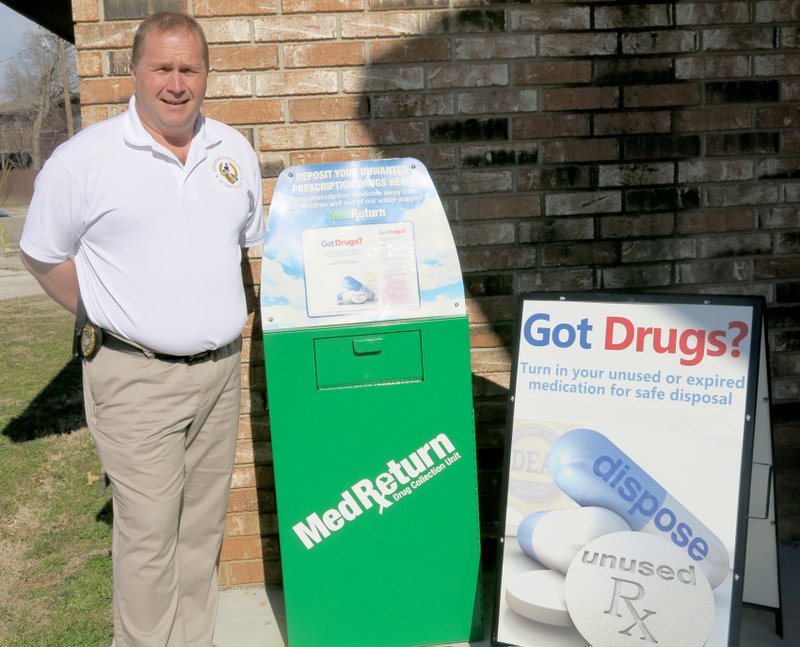GRAVETTE -- Although the national drug take-back program has been discontinued, Andy Bower, Gravette's police chief, and Sergeant James Rusterholz, of the Gravette Police Department, said they plan to continue the program in Gravette "indefinitely."
A MedReturn Drug Collection Unit is installed in front of the Gravette Police Station and persons can deposit outdated and unwanted drugs, both prescription and over-the-counter, there anytime, 24 hours a day, seven days a week.
Several persons were responsible for bringing the drug collection unit to Gravette. When Chief Bower learned they were available from the Arkansas Department of Health, he shared the news with the department. Rusterholz requested one and submitted an application in September of 2013. When it was awarded only a couple of weeks later, he traveled to Camp Robinson in North Little Rock and picked it up. Concrete work was donated by Jeff Brewer, a base was poured and the box was installed several months later.
Gravette was one of 60 agencies from throughout the state which were awarded the units, purchased by the Arkansas Trauma System's Injury and Violence Prevention funds as part of an effort to address illicit and illegal use of prescription drugs in the state. The effort was initiated in an attempt to help reduce injury and violence related to misuse of drugs.
The Drug Enforcement Agency held its last drug take-back day in September of 2014. At the same time it expanded its rules to allow the public to dispose of controlled substances at drop boxes such as the one at the Gravette Police Station. The amended ruling allows law enforcement agencies to have drop boxes for scheduled narcotics without the DEA's oversight.
The DEA previously worked closely with law enforcement agencies to ensure the safe collection and disposal of narcotics; but now registered collectors, including the Gravette Police Department, will be responsible for disposing of the drugs. Drugs collected in the past have been taken to the State Police Headquarters in Springdale where the DEA collected them for disposal and took them to an incinerator at Huntsville, Ala., to be destroyed. The Gravette PD is currently working on a new plan for disposal.
Speaking of the drug take-back program, Steve Varady, Arkansas' interim drug director, said, "It's been very successful in terms of the weight collected."
He noted that Arkansas was fourth per capita in the U.S. in the amount of weight collected. Arkansas collected more than 19.6 tons of controlled drugs during the last year of the nine-year statewide effort, according to a state drug take-back fact sheet. Gravette Police Department alone has collected and turned in for disposal over 140 pounds of drugs, according to Rusterholz.
Varady said there is a lot of interest in continuing a drug take-back program statewide "and we would like to, but we would have to have statewide collaboration and some logistics would need to be worked out."
He said the program helps reduce teen prescription drug abuse, which has decreased significantly in Arkansas over the last five years. But those rates vary according to who is doing the counting. Though it is difficult to directly tie the success rates of the drug take-back program to a drop in teen prescription drug abuse, most acknowledge there is bound to be a connection.
Any efforts to reduce teen drug abuse are to be commended, to help revise a statistic of which the state is not so proud. According to the Office of National Drug Control Policy's Teen and Prescription Drugs report, Arkansas has consistently ranked among the 10 states with the highest rate of non-medical use of pain relievers by 12- to 20-year-olds since state estimates of this measure first began in 2002.
Gravette police officers said that is reason enough to continue the program. The drug collection box makes it convenient for anyone to dispose of outdated or unwanted drugs. Any unauthorized drugs removed from area households will help reduce their availability for teen family members and thus the temptation to misuse them.
The program also has environmental advantages because the drugs are collected for disposal instead of being flushed down the toilet and into waterways.
General News on 02/25/2015

